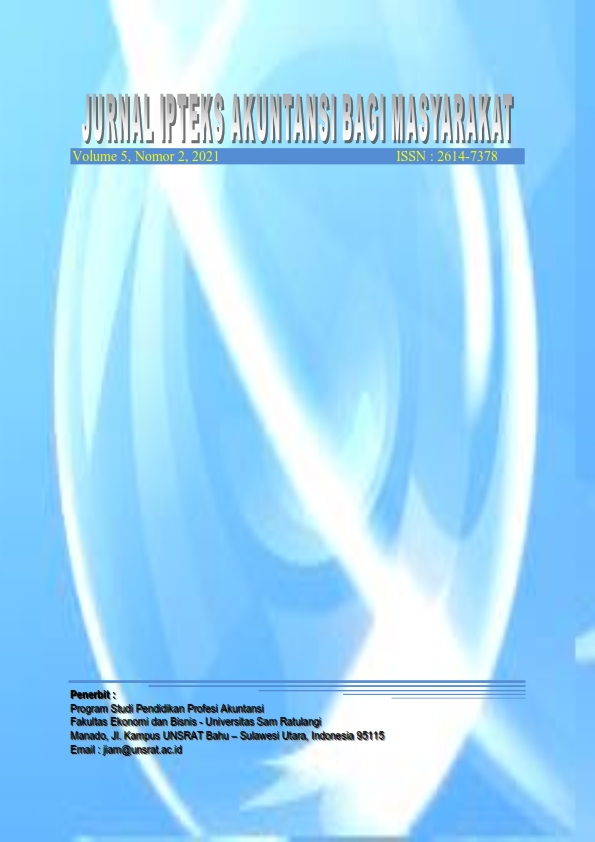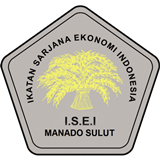PENDAMPINGAN E-FINANCE BUSINESS PADA PRODUSEN KAMPUNG KUE RUNGKUT SURABAYA
DOI:
https://doi.org/10.32400/jiam.5.2.2021.36261Keywords:
training, mentoring, e-business, cake manufacturerAbstract
Kampung Kue Rungkut Surabaya is one of the icons of the city of Surabaya and as a culinary center that has been developed after the monetary crisis in 1998. Business management is not good, financial management and human resources are poorly planned, and bookkeeping administration support is also not available so they are not able to assess their business performance. In real terms and unable to predict future business conditions. Community service activities are carried out using two methods, namely training and business assistance. The e-business-based business management training was aimed at cake producers and the younger generation, which was attended by 24 active members of the cake village community. This training has succeeded in providing insight, especially for the younger generation, that business is not only focused on production, but requires strategy and technology adaptation in business, known as business digital (e-business). Next is mentoring activities that are not just observations, but the implementation team tries to help create business development towards e-business. The results of the training and assistance in the form of increasing the role of the younger generation, increasing the understanding of members of the village cake community, improving the administration of the community, developing business information systems, compiling simple reports. Community service activities also received support from the Surabaya City Cooperatives and UMKM Service and BPR Artha Unggul Surabaya. The potential and condition of the Kampung Kue Rungkut Surabaya still has hope to be developed. Therefore, the possibility of development carried out by the implementing team with partners is to conduct trials to the implementation of e-business in order to be able to improve the people's economy as before the COVID-19 pandemic and make Kampung Kue a culinary and educational tourism village in the city of SurabayaReferences
Aryan, Eka P. N., & Novika, Wahyuhastuti. (2017). Start up digital business: Sebagai solusi penggerak wirausaha muda. Jurnal Nusamba, 2(1), 1–9. https://doi.org/10.29407/nusamba.v2i1.701
Avriyanti, S. (2021). Strategi Bertahan Bisnis di Tengah Pandemi COVID-19 dengan Memanfaatkan Bisnis Digital (Studi pada UKM yang Terdaftar Pada Dinas Koperasi, Usaha Kecil dan Menengah Kabupaten Tabalong). Jurnal Pemikiran Dan Penelitian Administrasi Publik Dan Administrasi Bisnis, 5(1), 60–73. https://doi.org/10.35722/pubbis.v5i1.380
Bashir, Babatunde Alao., & Oladejo, Lukman G. (2020). Coronavirus Pandemic and Business Disruption : The Consideration of Accounting Roles in Business Revival. International Journal of Academic Multidiciplinary Research, 4(5), 108–115. http://www.ijeais.org/ijamr/index.php/ijamr-4-5-2020/
Bae, S., Sung, E. C., & Kwon, O. (2021). Accounting for social media effects to improve the accuracy of infection models : combatting the COVID-19 pandemic and infodemic. European Journal of Information Systems, 00(00), 1–14. https://doi.org/10.1080/0960085X.2021.1890530
Cole, H. S., DeNardin, T., & Clow, K. E. (2017). Small service businesses: Advertising attitudes and the use of digital and social media marketing. Services Marketing Quarterly, 38(4), 203–212. https://doi.org/https://doi.org/10.1080/15332969.2017.1394026
Cole, Aryan.P. N., & Wahyuhastuti, N. (2017). Start Up Digital Business: Sebagai Solusi Penggerak Wirausaha Muda. Jurnal Nusamba, 2(1), 1–9. https://doi.org/10.29407/nusamba.v2i1.701
Fahmi, I., Fachruddin, R., & Silvia, V. (2019). Analisis E-Business pada Keputusan Kewirausahaan Bisnis Digital ( Sebuah Kajian Literatur Studi ). In Proseding Seminar Nasional Kewirausahaan 1(1), 71–75. . http://jurnal.umsu.ac.id/index.php/snk/article/view/3583
Febriyantoro, M. T., & Arisandi, D. (2018). Pemanfaatan digital marketing bagi usaha mikro, kecil dan menengah pada era masyarakat ekonomi ASEAN. Jurnal Riset Manajemen Dan Bisnis Dewantara (JMD), 1(2), 61–76. https://doi.org/10.26533/jmd.v1i2.175
Fzlinda, N., & Hanim, K. (2020). The Impact of Covid-19 Pandemic Crisis on Micro Enterprises: Entrepreneurs Perpective on Business Continuity and Recovery Strategy. Journal of Economics and Business, 3(2), 837–844. https://doi.org/10.31014/aior.1992.03.02.241
Hasanat, M. W., Hoque, A., Shikha, F. A., & Anwar, M. (2020). The Impact of Coronavirus (Covid-19) on E-Business in. Asia Journal of Multidiciplinary Studies, 3(1), 85–90. https://asianjournal.org/online/index.php/ajms/article/view/219
Hudiwinarsih, Gunasti., & Supriyati. (2019). Accounting and Tax Knowledge bagi Usaha Kecil dan Menengah Sub Sektor Jasa di Surabaya. Jurnal Pengabdian Dan Pemberdayaan Masyarakat UMP, 3(1), 71–76. http://jurnalnasional.ump.ac.id/index.php/JPPM/article/view/2799/2438
Liguori, E. W. (2020). Strategies for small business : Surviving and thriving in the era of COVID-19. Journal of The International Council for Small Business, 1(2).106-110. https://doi.org/10.1080/26437015.2020.1779538
Pantano, E., Pizzi, G., Scarpi, D., & Dennis, C. (2020). Competing during a pandemic? Retailers’ ups and downs during the COVID-19 outbreak. Journal of Business Research. 116.209-213. https://doi.org/10.1016/j.jbusres.2020.05.036
Samsul, Hadi. (2020). Revitalization Strategy for Small and Medium Enterprises after Corona Virus Disease Pandemic (Covid-19) in Yogyakarta. Journal of Xian University of Architecture & Technology, XII(2), 4068–4076.
Supriyati., Hudiwinarsih, G., & Muazaroh. (2020). Pendampingan Pembukuan Sederhana Bagi Usaha Kerajinan Enceng Gondok dan UMKM Pemula Di Surabaya. Jurnal Pengabdian Masyarakat J-Dinamika, 5(2), 158–163. https://doi.org/10.25047/j-dinamika.v5i2.1951
Supriyati., & Wulanditya, Putri. (2012). The SME Perception Toward The Accounting Standard Without Public Accountability (SAK ETAP) and Self Assessment System For Increasing Voluntary Tax Compliance. International Journal of Business and Management, 4(1). https://ejournals.ph/article.php?id=3587
Downloads
Published
Issue
Section
License
Authors who publish with this journal agree to the following terms:
- Authors retain copyright and grant the journal right of first publication with the work simultaneously licensed under a Creative Commons Attribution License that allows others to share the work with an acknowledgement of the work's authorship and initial publication in this journal.
- Authors are able to enter into separate, additional contractual arrangements for the non-exclusive distribution of the journal's published version of the work (e.g., post it to an institutional repository or publish it in a book), with an acknowledgement of its initial publication in this journal.
- Authors are permitted and encouraged to post their work online (e.g., in institutional repositories or on their website) prior to and during the submission process, as it can lead to productive exchanges, as well as earlier and greater citation of published work (See The Effect of Open Access).







